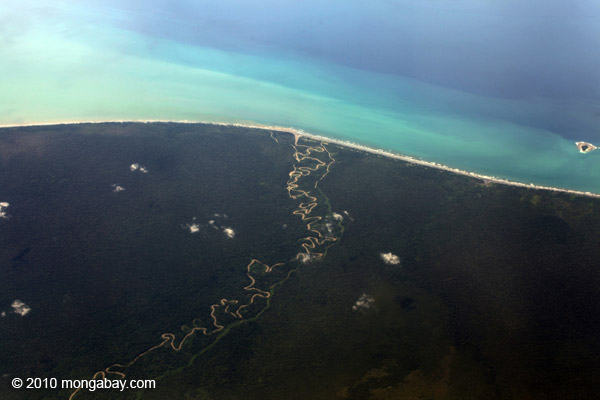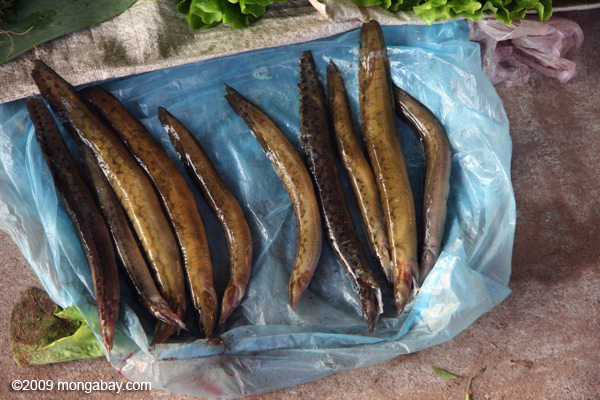Mongabay.org has selected winners of three environmental reporting prizes under its Special Reporting Initiatives (SRI) program. The three prizes, which were launched in January, explore the impacts of rising human consumption on forest and marine ecosystems.
The winners, selected from more than 150 applicants by a panel of issue-area experts, include Robert S. Eshelman, Ruxandra Guidi and Bear Guerra, and Dominic Bracco II and Erik Vance. The winners receive a stipend and travel funds to research and write a series of in-depth articles over a six-month period. The topics include cleaning up commodity supply chains, community forestry as a climate change solution, and the market for sustainable fisheries products in China.
“The SRI program aims to stimulate reporting on environmental issues that haven’t garnered much attention from mainstream media outlets,” said Mongabay.org President Rhett A. Butler. “I’m very excited to see the stories that result from these new SRI topics which explore the challenges of protecting the environment in the face of rising global population and consumption.”
Cleaning up commodity supply chains:
Clean Break: How the U.S. might help curb Indonesian deforestation and global climate change
SRI Fellow Robert S. Eshelman
Deforestation accounts for roughly ten percent of global greenhouse gas emissions, more than that created by all the world’s cars and trucks. Just four commodities – soy, palm oil, beef, and pulp/paper – are responsible for the majority of global deforestation and the U.S. is a leading consumer market for those goods. U.S. law protects endangered hardwoods, yet enforcement has been sporadic. In his reporting, Robert will investigate the links between U.S. consumer goods and the destruction of Indonesian forests and how U.S. law might be used to address a leading cause of climate change.

Where the forest meets the sea in West Paupa, Indonesia. Photo by Rhett A. Butler / mongabay.com
Community Forestry as a climate change solution:
Between the Forest and the Sea: Climate Change and Community Forest Management in Kuna Yala, Panama
SRI Fellows Ruxandra Guidi and Bear Guerra
Ruxandra Guidi & Bear Guerra’s stories will explore what’s at stake for indigenous groups like the Kuna of Panama, whose livelihoods and homes are already being affected by sea level rise and climate change, and the ways in which they are adapting to it while trying to preserve their customs and sovereign control of their forests. On the other hand, they will examine how the Kuna continue to manage their forests as they have for generations; they’ll examine what can be learned from them about community forest management, and what can be applied to other modern-day forest-dependent communities facing similar situations.
 Forest landscape in Panama. Photo by Rhett A. Butler / mongabay.com
Forest landscape in Panama. Photo by Rhett A. Butler / mongabay.com
Is there demand for sustainable fisheries products’ in China?:
From the plate and from the sea: tracking the realities of the market for sustainable seafood in China
SRI Fellows Dominic Bracco II and Erik Vance
China is the world’s largest consumer and producer of seafood products, with its practices substantially impacting global fisheries management and ocean health far from its own shores, from West Africa to the Western Pacific. While some markets are moving toward more responsibly sourced seafood, it’s unclear whether this shift is taking place in China. Is there a market for sustainable seafood in China? Erik Vance and Dominic Bracco II will explore this question from two angles: from the plate and from the sea. They will report on restaurants serving sustainable seafood to Chinese diners as well as the fishing boats of Thailand where much of the seafood eaten in China is caught.

Eels in a fishmarket. Photo by Rhett A. Butler / mongabay.com
All reporting for these SRIs will appear in 2014. Mongabay.org’s SRI program currently has three other fellows writing on other environmental topics.
Mongabay.org has one SRI project that is currently accepting applications: Benefits of Amazonian protected areas. Applications are due Friday, April 18th.
Other opportunities will be announced in coming months. Interested parties can sign up for notification of new opportunities via the SRI newsletter.
1 thought on “Three SRI Winners Selected to Report on Drivers of Deforestation, Community Forestry, and Sustainable Seafood in China”
Comments are closed.